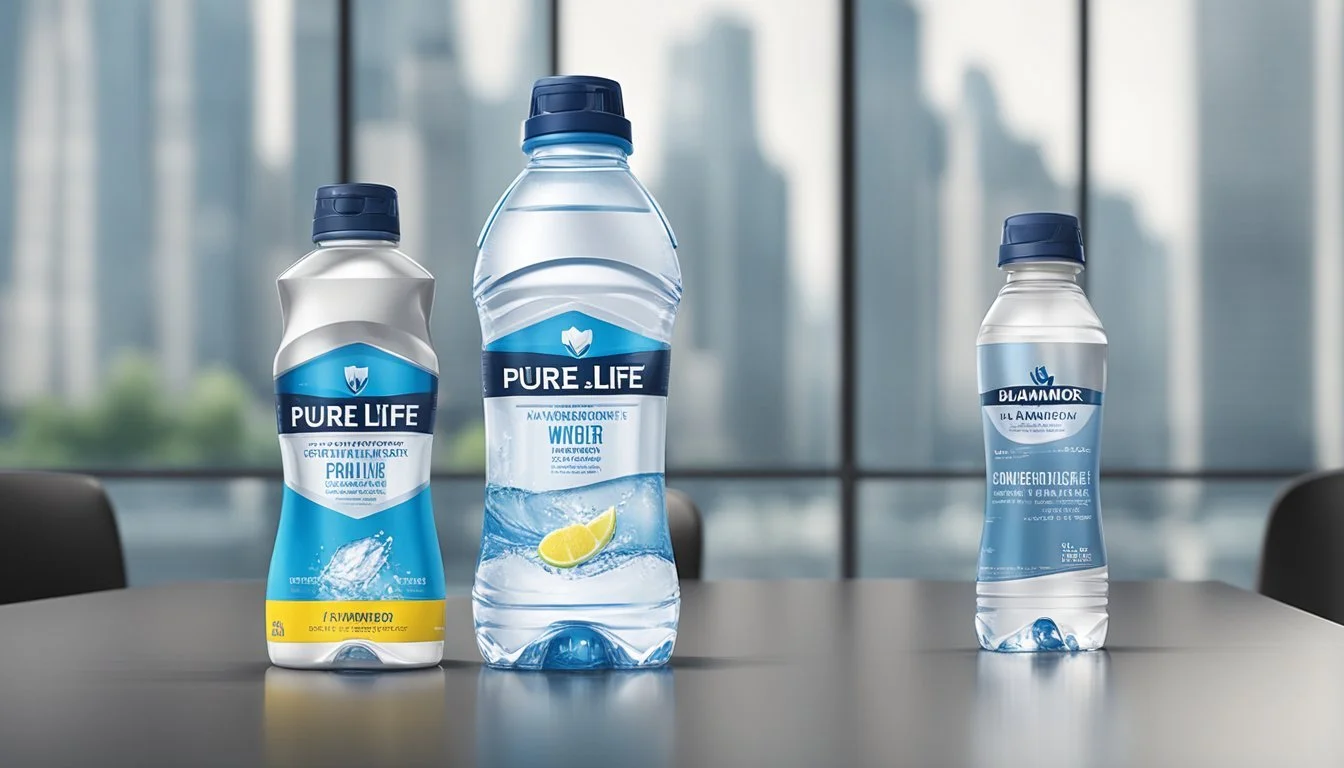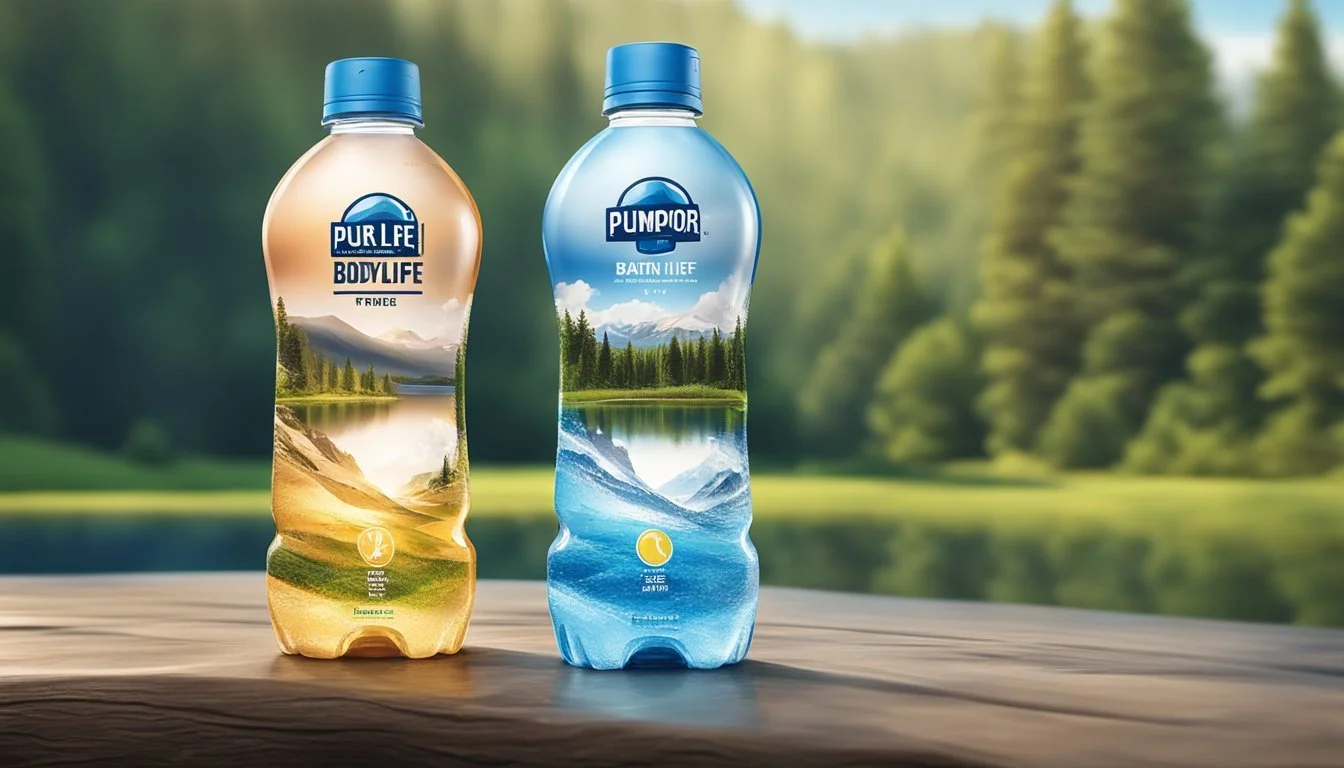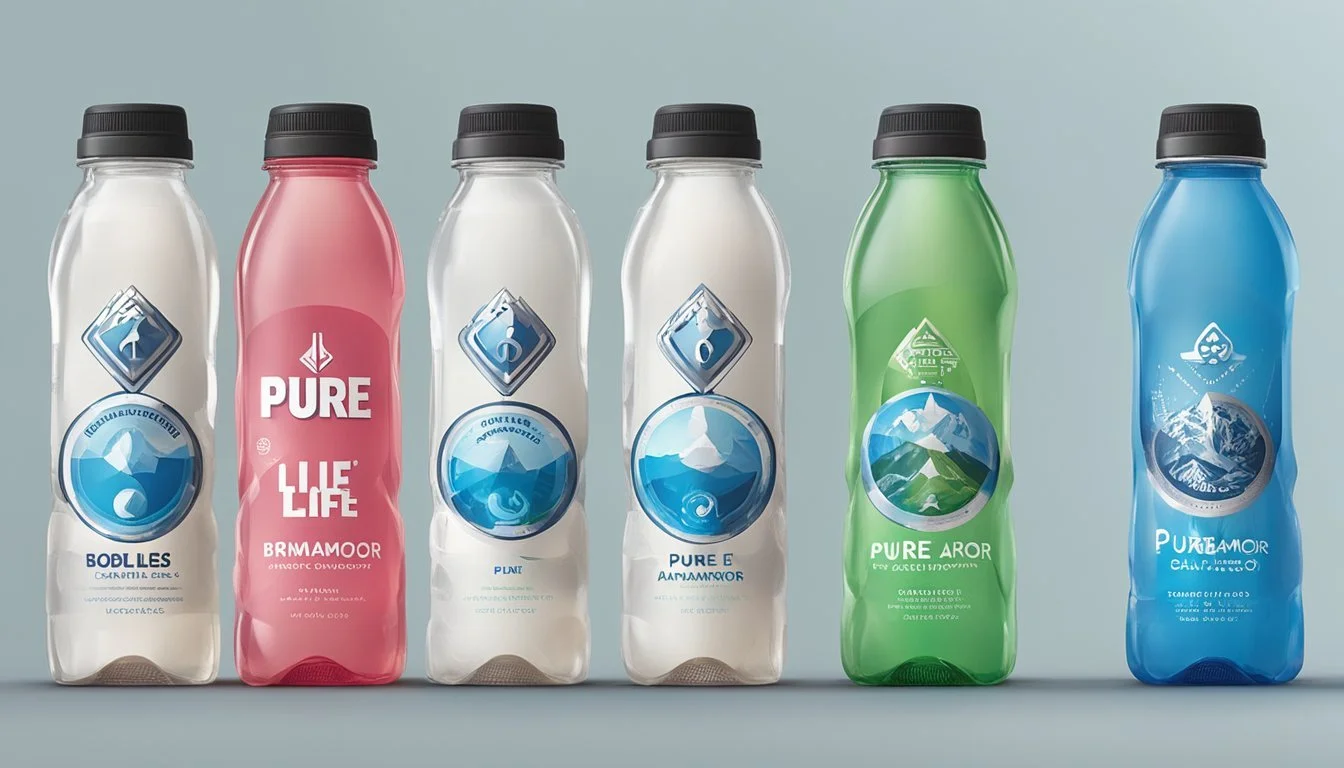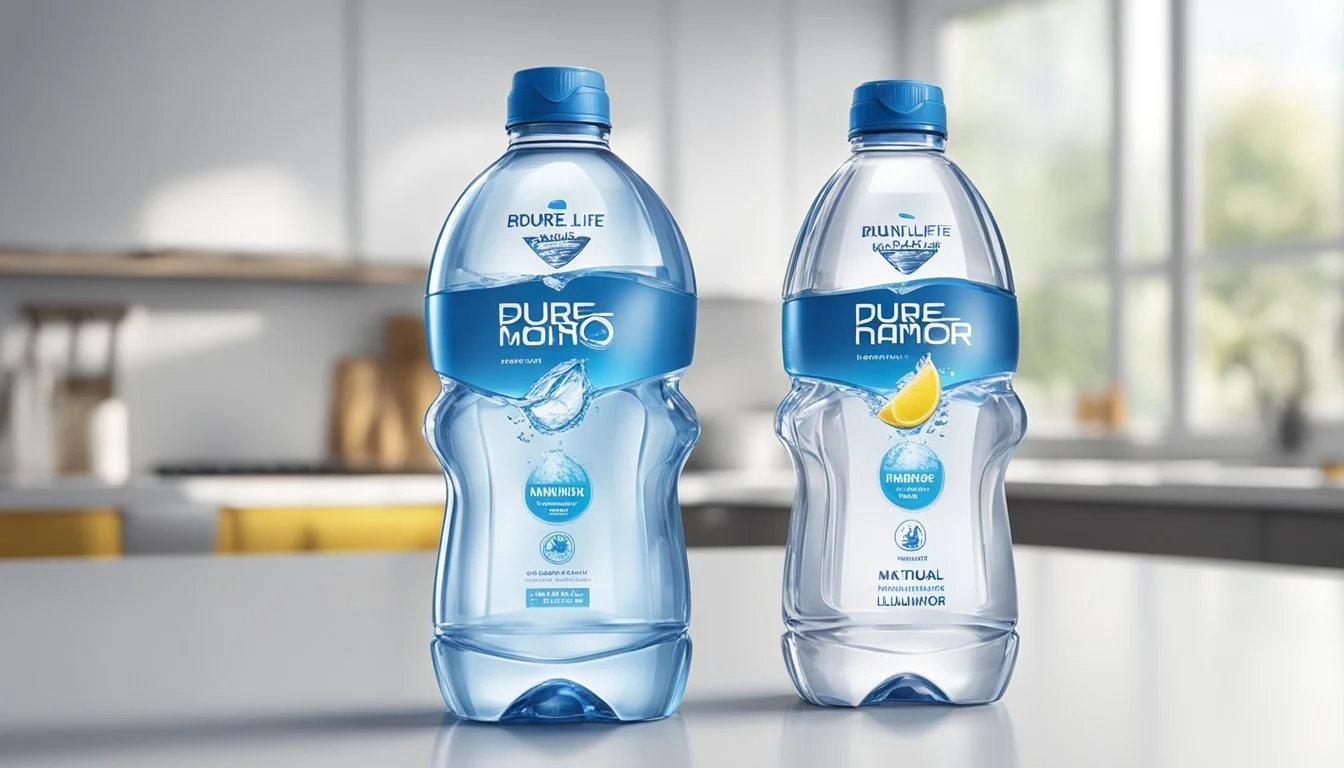Pure Life vs. BodyArmor
Comparing the Best Bottled Water Brands
When it comes to choosing between Pure Life and BodyArmor bottled water, the competition is tight, yet distinct differences emerge upon closer inspection. Pure Life, produced by Nestlé, is known for its widespread availability and affordability, making it a staple in many households and office spaces. By contrast, BodyArmor, although relatively newer on the scene, has positioned itself as a premium hydration option, often enhanced with electrolytes and marketed towards athletes.
Pure Life offers a reliable, straightforward hydration solution without the frills. Its taste is clean and balanced, albeit with some critics mentioning a slight tang. On the other hand, BodyArmor's appeal lies in its added benefits, such as electrolytes and vitamins, which aim to provide more than just basic hydration.
For those seeking straightforward bottled water without additional nutrients, Pure Life remains a dependable choice. Meanwhile, BodyArmor stands out for active individuals looking for hydration with an extra boost, making it a strong contender in the premium bottled water market.
Unveiling the Contenders: Pure Life and BodyArmor
Pure Life and BodyArmor are two popular bottled water brands, each offering unique benefits to consumers.
Pure Life is known for its affordability and wide availability. It undergoes rigorous purification processes to ensure safety and taste. This brand focuses on providing clean, reliable water for everyday hydration needs, making it a staple in many households.
BodyArmor water stands out for its alkaline properties and added electrolytes. Marketed as a premium hydration option, it appeals to athletes and fitness enthusiasts. With a pH balance that supports recovery, BodyArmor offers a distinctive choice for those seeking more than basic hydration.
Feature Pure Life BodyArmor Purification Process Multi-step purification Vapor-distilled, added electrolytes pH Level Neutral Alkaline (high pH) Target Audience General consumers Athletes, active individuals Availability Widely available Select stores, specialty shops
Comparing these two brands, it’s clear each has its strengths. Pure Life focuses on affordability and accessibility, ensuring clean water is within reach of the average consumer.
BodyArmor, on the other hand, is tailored for those who require enhanced hydration. Its added electrolytes and alkaline nature make it suitable for post-workout recovery and active lifestyles.
Ultimately, choosing between Pure Life and BodyArmor depends on individual needs and preferences, whether they prioritize cost and convenience or enhanced hydration and wellness benefits.
Water Sourcing and Composition
Pure Life and BodyArmor have distinct approaches to sourcing and treating their water. Each brand's methods shape the product's final composition and impact the hydration experience.
Natural Sources and Aquifers
Pure Life sources its water from public sources and then subjects it to rigorous purification. This ensures a consistent taste and quality regardless of the source.
BodyArmor bottles its water from natural springs and aquifers, including sources in protected areas. The water often flows through natural filtration mediums like volcanic rock, enhancing its purity.
The reliance on natural springs provides BodyArmor with a mineral-rich profile, whereas Pure Life’s process aims for purity and consistency.
Filtration and Purification Processes
Pure Life employs a multi-step filtration process. This involves reverse osmosis, carbon filtration, and UV light treatment to remove impurities and contaminants. The end result is purified water with little to no variance in taste or quality.
BodyArmor emphasizes maintaining the integrity of the water's natural state. While they do filter the water to ensure safety, their process is less intensive to preserve natural minerals and electrolytes found in spring water.
This approach caters to those seeking water that retains its natural properties.
Mineral and Electrolyte Content
Pure Life may add minerals back into the water after purification to ensure a balanced taste. These include magnesium sulfate, potassium bicarbonate, and calcium chloride, all of which aim to provide a consistent sensory experience.
BodyArmor naturally contains minerals because of its spring sources. Additionally, it is enhanced with electrolytes making it suitable for replenishment post-exercise.
The mineral content in BodyArmor includes key electrolytes such as potassium and magnesium, differentiating it from more purified options like Pure Life.
Health and Hydration
Proper hydration is crucial for both athletes and general consumers. Key aspects to consider include the benefits for hydration, the impact of minerals on muscle function and fluid balance, and addressing potential health concerns related to contaminants and additives.
Hydration Benefits for Athletes and Consumers
BodyArmor is designed with athletes in mind, offering electrolytes like potassium, magnesium, and calcium. These help maintain optimal fluid balance during strenuous activities.
BodyArmor:
Potassium: Helps with muscle function and nerve signaling.
Magnesium: Aids in muscle relaxation and preventing cramps.
Calcium: Supports muscle contractions and bone strength.
Pure Life provides reliable hydration, suitable for everyday use, with a balanced mix of essential minerals. This makes it a solid choice for those looking to maintain general hydration without extra additives.
Mineral Impact on Muscle Function and Fluid Balance
Electrolytes are vital for muscle performance and fluid regulation. BodyArmor contains a higher concentration of electrolytes compared to Pure Life, catering specifically to the needs of active individuals.
BodyArmor’s Electrolyte Profile:
Potassium: Supports muscle contractions and heart function.
Magnesium: Crucial for ATP production, enhancing energy levels.
Calcium: Necessary for proper muscle and nerve functions.
Pure Life includes a standard blend of minerals which is beneficial for maintaining day-to-day fluid balance but may not be as specialized for athletic performance.
Addressing Health Concerns: Contaminants and Additives
Both Pure Life and BodyArmor are subject to stringent testing to ensure safety. Contaminants like heavy metals (e.g., lead) and harmful chemicals (e.g., BPA) are monitored closely.
Pure Life:
BPA-Free Packaging: Ensures no transfer of harmful chemicals from bottle to water.
Natural Flavors and Sweeteners: Minimal use, focusing on pure hydration.
BodyArmor:
Includes natural flavors and sweeteners, enhancing taste but potentially introducing additional ingredients some consumers may wish to avoid.
Staying informed about the source of the water and the safety measures taken can help consumers choose a product that aligns with their health priorities.
Taste and Palatability
The taste of bottled water can be influenced by factors like pH levels and mineral composition, as well as individual preferences. Understanding these elements helps in distinguishing between options like Pure Life and BodyArmor.
The Influence of pH and Mineral Composition on Taste
The pH level and mineral content of water are major determinants of its taste. Pure Life typically undergoes a meticulous filtration process, resulting in a neutral pH close to 7, and minimal mineral content.
BodyArmor, on the other hand, often emphasizes the addition of electrolytes, which can include minerals like potassium and sodium. These additions can result in varying pH levels, typically ranging from slightly acidic to neutral. The mineral content can also lend a slightly salty or metallic taste, depending on the concentration and type of minerals added.
Personal Preference and Water Taste Perception
Individual taste preferences play a crucial role in choosing between Pure Life and BodyArmor. Some people may prefer the cleaner, more neutral taste of Pure Life, finding it refreshing and unobtrusive.
In contrast, others might enjoy the subtly enhanced taste of BodyArmor, which can offer a slightly more flavorful experience due to the presence of electrolytes. These differences make personal taste perception a significant factor in deciding which bottled water is better suited for each individual.
Environmental and Sustainability Considerations
This section examines the environmental footprint of Pure Life and BodyArmor, focusing on their bottling processes, plastic waste, recycling initiatives, and packaging innovations.
Bottling Process and Plastic Waste
The bottling process for Pure Life involves demineralization and the addition of minerals for taste consistency. This process ensures a uniform flavor profile. Pure Life uses PET plastic for its bottles, contributing to plastic waste.
BodyArmor, in contrast, aims to minimize its environmental impact by employing more eco-friendly bottling methods. They are increasingly using rPET (recycled PET plastic) in their packaging, helping reduce the reliance on new plastic.
Despite efforts from both brands, the production of bottled water remains a significant contributor to plastic waste. Pure Life and BodyArmor's approaches emphasize the ongoing need for the bottled water industry to address this environmental challenge through innovative solutions and reduced plastic usage.
Recycling Initiatives and Packaging Innovations
Pure Life has implemented recycling programs to encourage consumers to recycle their used bottles. They have also invested in using bottles made from partially recycled materials to reduce their ecological footprint.
BodyArmor has been proactive in exploring sustainable packaging solutions. They recently introduced bottles made from 100% recycled plastic in some regions. Additionally, BodyArmor supports initiatives that promote responsible plastic management and emphasize sustainability.
Both brands recognize the importance of reducing their environmental impact. Their efforts in recycling and packaging innovations reflect a commitment to more sustainable practices, demonstrating that effective waste management and reduced reliance on single-use plastics are achievable goals for the industry.
Market Trends and Consumer Preferences
The bottled water market is evolving with increased interest in both alkaline and specialty waters, and shifting consumption patterns towards healthier alternatives. Major brands influence these trends significantly.
Emergence of Alkaline and Specialty Waters
Alkaline water has become increasingly popular due to perceived health benefits, such as improved hydration and acid-neutralizing properties. Brands like BodyArmor and Pure Life are tapping into this trend by offering high-pH products that claim to boost energy and enhance performance.
Specialty waters, including those with added vitamins or minerals, are also gaining traction. These products cater to niche markets seeking more than just basic hydration, often appealing to athletes and health-conscious consumers.
Shifts in Consumption: Healthier Alternatives and Brand Influences
Consumers are increasingly prioritizing health, leading to a preference for bottled water over sugary beverages. This trend is reflected in the market growth of brands like Nestlé and Coca-Cola's Dasani, which emphasize purity and health benefits in their marketing.
Brand loyalty plays a significant role in consumer choices. Products that highlight sustainable practices and transparent sourcing often attract more conscientious buyers. The focus on sustainability and ethical sourcing has contributed to a growing demand for responsibly packaged bottled water options.
This direction is transforming the landscape, pushing brands to innovate and adapt to meet evolving consumer needs. As health trends continue to shape preferences, the bottled water market remains competitive and dynamic.
Economic Aspects
When comparing Pure Life and BodyArmor, the economic considerations revolve around the cost and value for money, as well as the comparison between premium bottled water and tap water.
Cost Comparison and Value for Money
Pure Life is a widely available brand known for its affordability. It often retails at lower prices compared to other premium brands. For example, a 24-pack can be found for around $4-5. Bulk pricing further reduces the cost per bottle, making it an economical option for daily hydration.
BodyArmor, on the other hand, positions itself as a premium brand with added functional benefits, such as electrolytes and vitamins. A single bottle might cost $1.50-$2.00, and multipacks do not bring the price down significantly. The additional cost reflects the added benefits targeted at active consumers seeking enhanced hydration.
While Pure Life provides value through affordability, BodyArmor's higher price is justified by its enhanced hydration benefits. Consumers need to weigh these factors depending on their specific needs and budget constraints.
Premium Bottled Water versus Tap Water
Premium bottled waters like BodyArmor offer enhanced benefits over standard tap water, which comes at little to no cost. Tap water is universally accessible and typically costs less than a cent per gallon. It undergoes rigorous testing and regulations in many regions, ensuring safety and reliability.
The cost differential becomes apparent when choosing bottled options. While tap water offers unmatched economic value, bottled waters cater to those seeking convenience, perceived purity, and additional functional ingredients. For instance, athletes and active individuals might prefer BodyArmor for its electrolyte content, despite its higher price compared to free tap water.
From an economic perspective, the decision between tap water and premium bottled water hinges on weighing the low-cost advantage of tap against the convenience and specific benefits bottled options provide.
The Verdict
When comparing Pure Life and BodyArmor, several factors come into play.
Hydration:
Pure Life offers reliable hydration with its consistent quality and pure taste. BodyArmor, on the other hand, includes electrolytes, which can be beneficial for those needing extra hydration after workouts.
Health Benefits:
While Pure Life is plain water with no additives, BodyArmor contains additional ingredients like potassium and magnesium. Some might prefer BodyArmor for these added minerals, though others might favor the simplicity of Pure Life.
Personal Preference:
Taste can be subjective. Pure Life has a clean, classic taste many enjoy. BodyArmor has a slight flavor due to its added components, which some might find appealing or others might find off-putting.
Convenience:
Pure Life water bottles often come in larger quantities, making it convenient for bulk purchasing. BodyArmor is available in a variety of sizes but is often priced higher due to its enhanced formulation.
Cost:
Generally, Pure Life tends to be more budget-friendly. BodyArmor, due to its additional benefits, might be a bit more expensive. This price difference can influence consumer choice based on budgetary preferences.
Packaging:
Both brands use recyclable packaging, but Pure Life often emphasizes larger packs, which might reduce the cost per bottle. BodyArmor’s packaging is often more robust due to its premium position in the market.
In essence, both Pure Life and BodyArmor have their distinct advantages, and the better choice depends on individual needs and preferences.
More About Pure Life
Cascade Mountain vs Pure Life: Which Bottled Water is Better?
Hawaii Volcanic vs Pure Life: Which Bottled Water is Better?
Hawaiian Springs vs Pure Life: Which Bottled Water is Better?
Icelandic Glacial vs Pure Life: Which Bottled Water is Better?
Nestle Pure Life vs Pure Life: Which Bottled Water is Better?
Pure Life vs Kirkland Signature: Which Bottled Water is Better?
Pure Life vs Whole Foods 365: Which Bottled Water is Better?
Richard's Rainwater vs Pure Life: Which Bottled Water is Better?
Solan de Cabras vs Pure Life: Which Bottled Water is Better?
Talking Rain AQA vs Pure Life: Which Bottled Water is Better?
Whole Foods Italian Still Mineral water vs Pure Life: Which Bottled Water is Better?
More About BodyArmor
BodyArmor vs Kirkland Signature: Which Bottled Water is Better?
Cascade Mountain vs BodyArmor: Which Bottled Water is Better?
Hawaii Volcanic vs BodyArmor: Which Bottled Water is Better?
Hawaiian Springs vs BodyArmor: Which Bottled Water is Better?
Icelandic Glacial vs BodyArmor: Which Bottled Water is Better?
Mountain Valley Spring Water vs BodyArmor: Which Bottled Water is Better?
Nestle Pure Life vs BodyArmor: Which Bottled Water is Better?
Richard's Rainwater vs BodyArmor: Which Bottled Water is Better?
Solan de Cabras vs BodyArmor: Which Bottled Water is Better?
Talking Rain AQA vs BodyArmor: Which Bottled Water is Better?
Whole Foods 365 vs BodyArmor: Which Bottled Water is Better?
Whole Foods Italian Still Mineral water vs BodyArmor: Which Bottled Water is Better?








